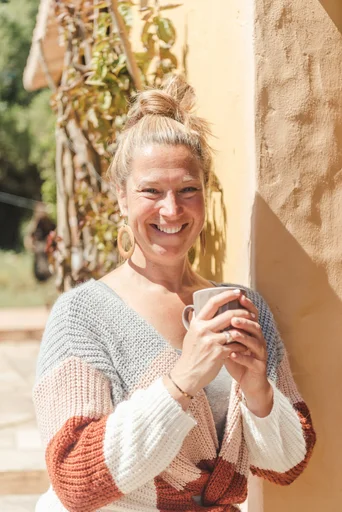9 Keys to Getting the Sleep You Need

Influencer Laura Burkhart shares her journey
Influencer Laura Burkhart has openly shared her profound struggle with a decade-long battle with insomnia and the breakthrough that ultimately led to her discovery of the keys to better sleep. In an interview with Yoga Journal Magazine, Laura revealed how she sought out yoga to combat serious health problems resulting from years of stress and chronic insomnia. This turning point in her life prompted her to change the course of her work, dedicating herself to helping others find relief and peace through yoga.
During the interview, Laura emphasized the significant impact that insomnia had on her overall well-being, highlighting the challenges she faced in falling asleep and staying asleep. She candidly discussed trying various guided sleep meditations in an attempt to alleviate her struggles. Additionally, she recounted how making simple changes, such as blacking out her bedroom, had an instant beneficial impact on her sleep quality.
Laura's journey serves as a powerful testament to the transformative potential of embracing holistic approaches to addressing sleep issues. Her personal experiences and insights offer valuable lessons for individuals seeking ways to improve their night time rest. Through sharing her story, Laura aims to provide hope and guidance for those navigating similar challenges.
Keys to Getting the Sleep You Need
Now that we understand the profound impact of holistic approaches to addressing sleep issues, let's delve into the essential keys to achieving the restful and rejuvenating sleep you need. These keys encompass controlling your environment and filtering your habits to create an optimal setting for quality sleep.
Control your environment
Creating a conducive sleep environment is crucial for achieving good sleep. The temperature and darkness of your bedroom play a significant role in promoting optimal sleep quality. According to the Sleep Foundation, maintaining a cool room, ideally between 60-67 degrees Fahrenheit, can facilitate falling asleep faster and enjoying deeper sleep cycles. Additionally, ensuring that your bedroom is dark by using blackout curtains or an eye mask can help signal your body that it's time to surrender to deep sleep.
When it comes to sound and silence, finding the right balance is key. While some people find comfort in total silence, others may benefit from white noise or soothing sounds such as nature sounds or calming music. Experimenting with different soundscapes can help you identify what works best for you in creating a peaceful sleeping environment.
Filter your habits
In addition to environmental factors, our daily habits significantly impact our ability to achieve restful sleep. One of the most impactful habits is managing our caffeine and alcohol intake. Studies have shown that reducing caffeine consumption, especially in the afternoon and evening, can positively influence total sleep time and reduce instances of waking up during the night.
Similarly, moderating alcohol intake before bedtime is essential for quality sleep. While alcohol may initially make you feel drowsy, it can disrupt your overall sleep cycle, leading to fragmented and less restorative sleep. Therefore, being mindful of the timing and amount of alcohol consumed can contribute to improved overall sleep health.
By taking control of our environment and filtering our habits, we pave the way for better sleep quality and overall well-being.
Laura Burkhart Updated Sep: Incorporating Yoga and Meditation

Incorporating yoga and meditation into your daily routine can have a profound impact on your ability to achieve restful sleep. Influencer Laura Burkhart offers invaluable insights into how these practices have played a pivotal role in her journey towards better sleep.
Yoga Poses for relaxation
Yoga has been widely recognized for its ability to promote relaxation and alleviate stress, making it an effective tool for improving sleep quality. Yoga Journal recommends specific poses that are particularly beneficial for inducing relaxation before bedtime. These include gentle forward bends such as Uttanasana (Standing Forward Bend) and Prasarita Padottanasana (Wide-Legged Standing Forward Bend), which help calm the mind and release tension from the body. Additionally, incorporating restorative poses like Supta Baddha Konasana (Reclining Bound Angle Pose) and Viparita Karani (Legs-Up-The-Wall Pose) can further enhance the body's readiness for deep, restorative sleep.
Creating a calming yoga practice involves integrating these poses into a sequence that focuses on gentle movements, deep breathing, and mindfulness. By engaging in a soothing yoga routine before bed, individuals can effectively prepare their bodies and minds for a peaceful night's rest.
Meditation to calm the mind
Meditation is another powerful tool for quieting the mind and promoting relaxation before bedtime. Techniques such as deep breathing exercises, progressive muscle relaxation, and guided imagery can help ease mental chatter and reduce negative thought patterns that may interfere with falling asleep.
Testimonials:
According to a testimonial from The Model Health Show, incorporating meditation had an instant beneficial impact on sleep quality.
Another testimonial from Yoga Journal highlights the effectiveness of sleep meditation in improving overall sleep quality.
Positive affirmations are also instrumental in cultivating a mindset conducive to restful sleep. By repeating affirmations such as "I am calm," "I am at peace," or "My mind is quiet," individuals can shift their focus away from stressful thoughts and create a positive mental environment for sleep.
Incorporating yoga poses for relaxation and embracing meditation techniques provides individuals with powerful tools to calm the mind, release tension from the body, and foster an environment conducive to achieving rejuvenating sleep.
Sleep You Need: Embracing a holistic approach
The role of the body in sleep
When it comes to achieving the rejuvenating sleep you need, the role of the body cannot be overstated. Physical exercise has been shown to have a profound impact on sleep quality, making it an essential component of a holistic approach to addressing sleep issues.
Scientific Research Findings:
According to a study published in Frontiers in Psychology, physical exercise can significantly positively predict sleep quality and reduce the risk of sleep problems like insomnia, obstructive sleep apnea, and restless legs syndrome. The study also highlights that physical exercise affects sleep quality through separate mediating effects of mindfulness and ruminative thinking.
Engaging in regular physical activity, such as aerobic exercise or yoga poses, can contribute to improved sleep quality. Exercise not only helps in falling asleep more quickly but also enhances the overall duration and depth of sleep. Furthermore, it has been found to reduce pre-sleep anxiety, which is often a significant barrier to achieving restful sleep.
Exercise and its impact on sleep quality
Incorporating regular physical exercise into your daily routine can have far-reaching benefits for your sleep. Whether it's engaging in cardiovascular activities like running or cycling, or embracing mind-body practices like yoga, finding an exercise regimen that resonates with you is crucial for promoting restful nights.
Aerobic exercises have been particularly noted for their positive effects on sleep quality. These activities not only decrease sleep complaints and insomnia but have also been found to have similar effects to sleeping pills. By engaging in aerobic exercises, individuals can experience improvements in both falling asleep and enjoying deeper, more restorative sleep cycles.
Moreover, yoga offers a unique blend of physical activity and mindfulness that directly contributes to better sleep. The gentle yet invigorating nature of yoga practice promotes relaxation while simultaneously enhancing body awareness. This combination creates an ideal foundation for achieving deep and restful slumber.
The importance of a consistent sleep schedule
In addition to incorporating physical activity into your routine, maintaining a consistent sleep schedule plays a pivotal role in optimizing your overall sleep health. Establishing regular bedtime and wake-up times helps regulate your body's internal clock, known as the circadian rhythm. This consistency reinforces your body's natural inclination towards rest at specific times, leading to more efficient and effective sleep cycles.
Consistency also extends beyond just bedtime hours; it encompasses creating a calming bedtime routine that signals to your body that it's time to wind down for the night. Engaging in relaxing activities such as reading, gentle stretching, or practicing mindfulness meditation before bed can help prepare your mind and body for a peaceful transition into slumber.
The power of the mind in achieving restful sleep
Managing stress and anxiety is fundamental when striving for restful nights. Incorporating mindfulness practices alongside physical exercise can significantly contribute to reducing mental chatter and promoting inner calmness before bedtime.
Positive affirmations play a vital role in cultivating a mindset conducive to restful sleep by shifting focus away from stressful thoughts towards affirming statements that foster tranquility. By integrating these practices into your nightly routine, you create an environment where both body and mind are primed for deep rejuvenation during sleep.
Burkhart shares the surefire strategies to end her decade-long battle
A summary of the 9 keys
In her journey to overcome a decade-long battle with insomnia, Laura Burkhart discovered and implemented nine essential keys that proved instrumental in achieving restful and rejuvenating sleep. These keys encompass controlling the sleep environment, filtering daily habits, incorporating yoga and meditation practices, and embracing a holistic approach to sleep health.
The first key involves creating a comfortable sleep environment, which is a simple but crucial first step in getting better sleep. Laura emphasizes the significance of maintaining an optimal room temperature, ensuring darkness for uninterrupted rest, and finding the right balance between sound and silence. By implementing these environmental adjustments, she experienced profound improvements in her ability to fall asleep and stay asleep.
Filtering daily habits played a pivotal role in Laura's journey towards better sleep. She recognized the impact of reducing caffeine and alcohol intake on her overall sleep quality. Additionally, being mindful of eating and drinking before bedtime significantly contributed to achieving more restful nights.
Incorporating yoga poses for relaxation became second nature for Laura as she sought ways to calm her mind and release tension from her body before bedtime. These gentle movements and deep breathing exercises prepared her for a peaceful transition into slumber.
Meditation also played a significant role in quieting Laura's mind before bed. By incorporating relaxing activities into her bedtime routine, she was able to maintain energy levels throughout the day while experiencing much better sleep quality.
Encouragement for the journey ahead
As individuals embark on their own journeys towards better sleep, it's essential to remember that progress takes time. Personal anecdotes from individuals who have successfully implemented these strategies serve as powerful sources of encouragement.
One such anecdote comes from Valerie, an ex-insomniac who struggled with falling asleep and staying asleep due to a significant sleep debt. After introducing guided sleep meditations into her nightly routine, Valerie experienced remarkable improvements in both the duration and quality of her sleep, leading to increased energy levels throughout the day.
Staying motivated during this journey is paramount. It's important to remain patient as changes take time to yield noticeable results. Embracing these surefire strategies requires dedication and consistency but can ultimately lead to transformative improvements in overall well-being.
See Also
Top Yin Yoga Poses for Improved Sleep - Yoga Magazine
7 Easy Methods to Discover Serenity | Yoga Techniques for Anxiety
Conquering Fear | Sally Kempton
We bring back the importance of initiation into womanhood by Roos-Veerle Krijnen & Ella-June Henrard
Welcome to the Women’s Initiation Retreat by Naked Truth Retreats, a transformative journey into the depths of your True Feminine Nature. This retreat, scheduled from 17th to 24th August 2024 in Portugal, invites you to remember the sacredness and wholeness of your being.
Roos-Veerle Krijnen & Ella-June Henrard



